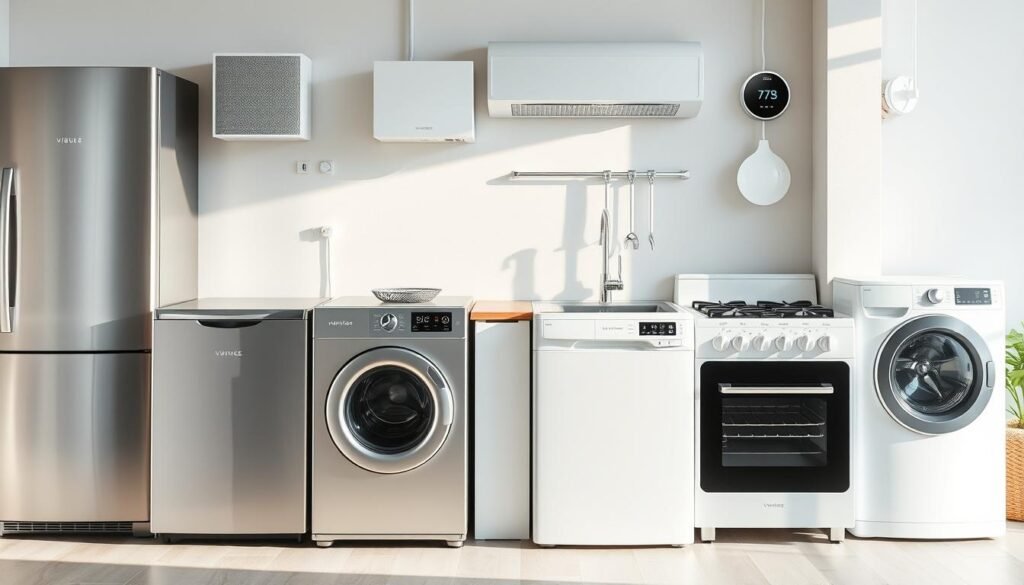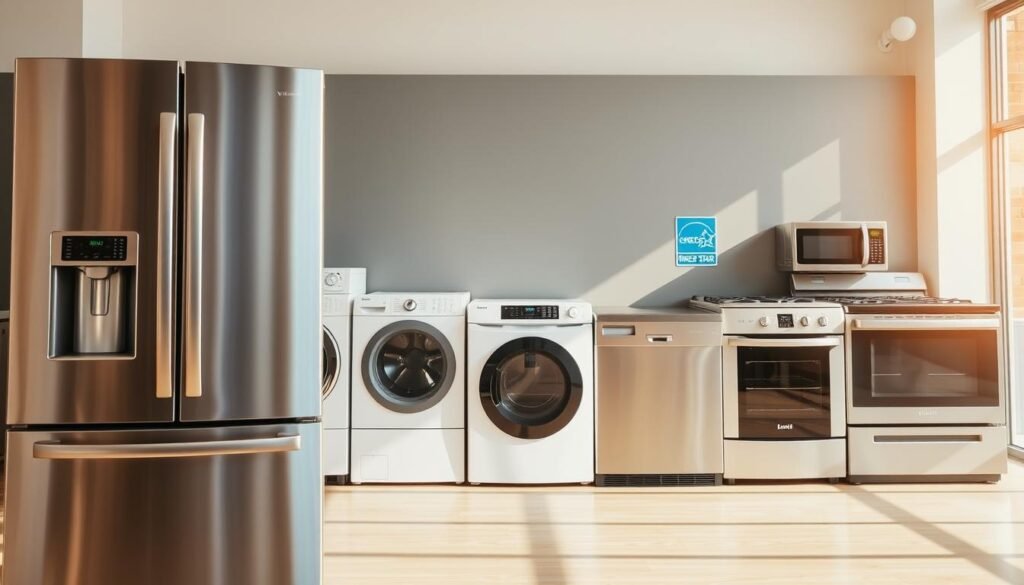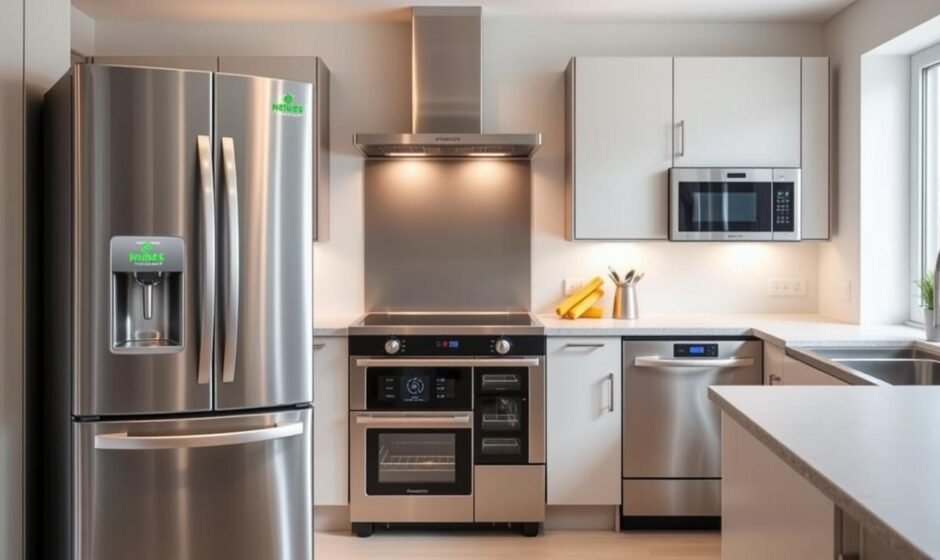Looking to lower your energy bills and help the planet? Start by upgrading to energy-efficient appliances. These can greatly reduce your household’s energy use. Plus, they’re becoming more popular in the UK.
By switching, you’ll save money and feel good about helping the environment.
The average UK home spends £1,254 a year on energy. Many are searching for ways to cut costs. Energy-efficient appliances can help, cutting power use by up to 50%.
Choosing these appliances can save you hundreds each year. It also reduces your carbon footprint.
Key Takeaways
- Upgrading to energy-efficient appliances can lead to significant savings on energy bills
- Eco-friendly home appliances can reduce your carbon footprint and contribute to a sustainable household
- Energy-efficient appliances can reduce power consumption by up to 50%
- UK households can save as much as £500 annually on energy bills by upgrading to energy-efficient appliances
- Energy-saving appliances can reduce carbon emissions by up to 25%
- Smart technology in appliances can lead to energy savings of up to 30% more than standard models
- Switching to energy-efficient models could help families cut energy consumption by up to 30%, saving as much as £376 each year
What Are Energy-Efficient Appliances?
Energy-efficient appliances use less energy but work just as well. They are key to sustainable household technology. They help cut down on energy use and lower your bills. Examples include refrigerators, washing machines, and dishwashers with high energy ratings.
When you’re looking for energy-saving white goods, check for A+ or A++ ratings. These are the most energy-efficient. For example, a washing machine with an A rating uses much less energy than one with a lower rating. Choosing these appliances helps the planet and saves you money.
Energy-efficient appliances have many benefits. They use less energy, lower your bills, and reduce carbon emissions. By picking energy-saving white goods and sustainable household technology, you help the environment and save money too.
Why Choose Energy-Efficient Appliances?
Choosing the right appliances for your home can really cut down on your energy bills and help the planet. Green kitchen appliances, for example, use less energy but work just as well as older models. By picking energy-efficient options, you can save money and help the environment.
Energy-efficient appliances have many benefits. They use less energy, which means lower bills and fewer emissions. For instance, a new fridge can save up to £100 a year. They also use less water and electricity, making them better for the planet.
Reduce Your Energy Bills
Switching to energy-efficient appliances can save you money. The average household spends a lot on energy. By choosing efficient appliances, you can cut down on costs. This can make a big difference to your budget.
Environmental Impact
Energy-efficient appliances are also good for the planet. They use less energy, which means fewer emissions. This helps fight climate change. Choosing these appliances is a simple way to help the environment.
Here are some examples of energy-efficient appliances and their benefits:
- Energy-efficient dishwashers save water and electricity with features like soil sensors.
- Energy-efficient heating and cooling systems use much less energy.
- Energy-efficient water heaters, like tankless models, cut down on energy waste.
Key Types of Energy-Efficient Appliances
Choosing the right energy-efficient appliances is key to a sustainable home. Items like refrigerators and washing machines can cut down your energy costs. This section will look at the main types of energy-saving appliances for your home.
Some of the most common energy-efficient appliances include:
- Refrigerators: Look for A-rated models, which can save you up to £360 over their 17-year lifetime.
- Washing Machines: Selecting an A-rated washing machine over a D-rated one could save approximately £95 in Great Britain and £110 in Northern Ireland over its 11-year lifetime.
- Dishwashers: The most energy-efficient dishwashers (A-rated) can save about £25 a year in Great Britain and £30 in Northern Ireland compared to the lowest-rated models of the same size.
- Heating Systems: Energy-efficient heating systems, such as smart thermostats, can reduce energy consumption significantly by adapting to user patterns and optimizing heating and cooling cycles.
By choosing these energy-efficient appliances, you can make your home more sustainable and lower your energy bills. Always check the energy rating label when buying new appliances. Think about the long-term savings and benefits of energy-efficient models.
| Appliance | Energy Rating | Annual Savings |
|---|---|---|
| Refrigerator | A-rated | Up to £360 over 17 years |
| Washing Machine | A-rated | Approximately £95 in GB and £110 in NI over 11 years |
| Dishwasher | A-rated | Up to £25 in GB and £30 in NI per year |
How to Identify Energy-Efficient Appliances
When you’re looking for energy-efficient appliances, it’s key to know what to search for. These appliances can cut down your energy bills and help make your home greener. They use less energy but work just as well.
First, check the energy label. It shows how efficient the appliance is, from A (best) to G (worst). Choose appliances rated C and above for big savings. Look for the ENERGY STAR label too. It means the appliance meets high energy standards.
It’s important to understand energy ratings when buying. The label tells you how much energy the appliance uses. For example, a fridge rated A++ uses less energy than one rated A+. Check if it has special features like automatic shut-off or energy-saving modes.
Some top energy-efficient appliances include:
- Refrigerators with energy-efficient compressors and insulation
- Washing machines with eco-mode cycles and low water consumption
- Dishwashers with energy-saving modes and quiet operation

Choosing energy-efficient appliances can lower your bills and help the planet. Always check the energy label and look for government endorsements. This way, you’ll get the best appliance for your needs.
| Appliance | Energy Rating | Energy Consumption |
|---|---|---|
| Refrigerator | A++ | 100 kWh/year |
| Washing Machine | A+ | 50 kWh/year |
| Dishwasher | A | 30 kWh/year |
Costs vs. Savings: The Investment
Thinking about energy-saving white goods and sustainable tech? It’s key to look at the costs and savings. At first, these appliances might cost more. But the long-term gains are big.
First, consider the upfront cost and how it compares to future savings. For example, energy-saving fridges might be £100 pricier than usual ones. But, you could save that back in just a couple of years. Plus, over time, you could save hundreds of pounds.
Here are some ways you can save:
- Energy-efficient washing machines cut down on energy and water bills.
- Models with higher energy ratings are more efficient, saving you money.
- Longer-lasting appliances mean more savings over time.
Here’s a table to show you the savings:
| Appliance | Initial Cost | Energy Savings |
|---|---|---|
| Energy-efficient refrigerator | £100 more than standard model | £600 over 17-year lifetime |
| Energy-efficient washing machine | Varies depending on model | Substantial reductions in energy and water bills |
Investing in energy-saving appliances and sustainable tech leads to big savings. It also helps the planet.
Comparing Brands and Models
Choosing green kitchen appliances means finding the best value. Energy-efficient appliances can cut your bills and help the planet. Start by looking at top UK brands like Bosch, Siemens, and Miele. They have a variety of energy-saving options.
Check the energy ratings of models you’re interested in. Look for A+++ ratings on fridges and washing machines. This helps you compare and choose wisely. Reading reviews and feedback can also give you insights into real-world performance.

When comparing, consider the energy rating, how much energy it uses, and how loud it is. Look for smart features, eco-modes, and automatic shut-off too. By picking the right appliances, you’ll save money and help the environment.
For instance, an A-rated fridge-freezer can save you about £800 over 17 years. An A+++ tumble dryer can save £980 over 13 years compared to a B-rated one. Making smart choices leads to big savings and a greener kitchen.
Practical Tips for Choosing Appliances
Choosing energy-efficient appliances requires careful thought. You need to pick ones that save energy and fit your home’s needs. Start by thinking about your household size, lifestyle, and what appliances you need. For example, a big family might need a bigger fridge or washing machine.
Don’t forget about space when picking appliances. Make sure they fit where you plan to put them. Also, look at how much energy they use. Opt for appliances with high energy efficiency ratings. These can cut down your bills and help the planet. Examples include smart fridges, eco-mode washing machines, and low-water dishwashers.
Here are some tips for picking energy-efficient appliances:
- Check the energy label and look for appliances with a high energy efficiency rating
- Consider the size and capacity of the appliance
- Look for appliances with eco-settings or smart technology
- Check the water consumption of dishwashers and washing machines
By using these tips, you can choose the best energy-efficient appliances for your home. Think about your needs, space, and energy use. This way, you’ll pick the right appliances. With energy-saving appliances and sustainable tech, you can save money and help the environment.
Maintenance for Efficiency
To keep your eco-friendly home appliances running well, regular maintenance is key. Start by checking your energy-saving appliances, like your fridge and dishwasher. Look for any seals that might be damaged to stop energy leaks.
Cleaning your appliances right is also important. For instance, cleaning your fridge’s condenser coils can make it work better and use less energy. Also, defrosting your fridge freezer often can save you money on your energy bills.
Routine Checks and Care
Some important routine checks include:
- Inspecting and replacing air filters on your heating and cooling systems
- Checking for and sealing air leaks to prevent heat loss
- Ensuring proper insulation in your home to reduce heating and cooling costs
Common Issues and Solutions
Problems with energy-saving appliances often include faulty thermostats and clogged filters. To fix these, you can:
- Replace the thermostat or filter
- Check the user manual for troubleshooting guides
- Get help from a professional if needed
By following these maintenance tips, your eco-friendly home appliances will keep working efficiently. Always remember to do routine checks and care to make your appliances last longer and work better.
| Appliance | Maintenance Tip | Energy Savings |
|---|---|---|
| Refrigerator | Clean condenser coils | Up to 5% energy savings |
| Dishwasher | Run only when full | Up to 10% energy savings |
| Heating System | Inspect and replace air filters | Up to 15% energy savings |
Government Schemes and Incentives
Thinking about getting energy-saving white goods and sustainable tech for your home? It’s key to look into UK government schemes and incentives. These can make it cheaper to buy energy-efficient appliances and improve your home. This way, you can use less energy and cut down on carbon emissions.
The UK government has put a lot of money into helping homes become more energy-efficient. They’ve set aside £12 billion for the Help to Heat schemes. Also, the Home Upgrade Grant phase 2 has given up to £630 million to local areas. The Social Housing Decarbonisation Fund got about £179 million for upgrades. These funds show the government’s strong support for energy efficiency and fighting energy poverty.
Some main government schemes and incentives are:
- Grants for energy-efficient appliances and home improvements
- Energy savings programmes, such as the Energy Company Obligation (ECO)
- Tax benefits and rebates for energy-efficient upgrades
By using these government schemes and incentives, you can make your home more energy-efficient. This will lower your energy bills and help the planet. It’s important to know the rules and how to apply for these schemes to get the most out of them.
Real-Life Savings from Energy-Efficient Appliances
Thinking about getting green kitchen appliances and energy-efficient appliances for savings? It’s good to see how they can cut your bills. Many UK homes have switched and seen big drops in their energy costs.
A family that updated to energy-saving appliances cut their bills by 20%. This is a big saving, even more so when you add in other energy-saving steps like better insulation and LED lights.
Energy-efficient appliances offer many benefits, including:
- Less energy use
- Lower bills
- Helping the environment
By choosing energy-efficient appliances for savings and changing your daily habits, you can cut your energy use and save money. For example, using green kitchen appliances and turning off unused appliances can reduce standby power use.
Here’s a look at how much you could save each year with different appliances:
| Appliance | Energy Consumption (kWh/year) | Annual Cost (£) |
|---|---|---|
| Old Refrigerator | 400 | 120 |
| Energy-Efficient Refrigerator | 200 | 60 |
| Old Washing Machine | 300 | 90 |
| Energy-Efficient Washing Machine | 150 | 45 |
As shown, the savings from energy-efficient appliances for savings are clear. They can make a big difference in your energy use and your wallet, even more so when combined with other energy-saving steps.
The Future of Energy-Efficient Appliances
The UK government aims to make homes carbon neutral by 2050. This goal is within reach thanks to new appliance technology. Expect to see better insulation, energy-saving compressors, and smart features soon.
By 2025, expect clothes dryers with heat pump tech and moisture sensors. These will cut down energy use a lot.
Energy-efficient LED bulbs will save up to 85% of energy compared to old bulbs. Eco-friendly shower heads and taps will also become common. They use less water and energy.
More people are seeing the value in energy-efficient appliances. They save money and help the planet.
Stay updated on government incentives like rebates and tax credits for these appliances. Upgrading can lower your bills and help the environment. Your choices today can make a big difference.




